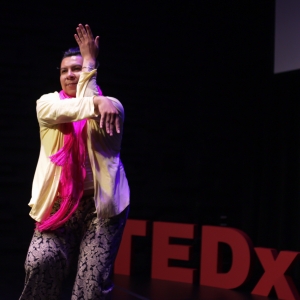I Dance, Therefore I Am
April 09, 2018 / by Lynn Lipinski- Students
MSW student Jose Richard Aviles’ recent TEDxUSC talk offers powerful message about finding strength from vulnerability, trauma (Photo by Mahira Raihan, Daily Trojan)
Jose Richard Aviles believes dance can be a tool for social change.
He knows this because dance has changed his own life.
He shared his journey in a courageous, emotional talk at TEDxUSC on April 7, reaching out with a powerful message to queer Latino youth, victims of sexual assault and anyone who struggles to overcome trauma’s impact on their lives.
The first student from the USC Suzanne Dworak-Peck School of Social Work to participate in the student-run TEDx series, Aviles gave his 14-minute speech before a crowd of about 130 students and community members. Hundreds of hours of work went into the talk, Aviles said, which blends Spanish and English, music and dance with spoken word and authentic emotion. This year’s theme was empowerment and inspiration.
Aviles, who grew up in south Los Angeles, is not waiting until he finishes his two master’s degrees (one at the USC Suzanne Dworak-Peck School of Social Work and the other at the USC Price School of Public Policy) to make a difference in the community. As an activist and dancer, he recognizes the need to provide young people with role models who have overcome trauma and a fear of being different.
For Aviles, the path to healing and self-acceptance was dance. But it was not easy.
“When I first went into the [dance] studio, the thoughts of something being wrong with my body would fog my artistry,” Aviles said. “And then I remembered that my body knows trauma. My body has been abused.” He used that trauma, and the resiliency born out of necessity, to learn to love his body just the way it was. His TEDxUSC talk places the sexual assault that took place in his childhood at its center and ends with a message of hope and strength.
“Dance is the way I reconnect to my heritage while I reimagine my future,” said Aviles. “I dance, therefore I am.”
He hopes that by sharing his experience, others will see how they can find the tools within to move past trauma and tragedy toward a brighter future.
Given his passion for changing lives, it is no surprise that Aviles applied to the school of social work at USC after working as a community organizer, looking to leverage his triple passions for gender studies, helping LGBT youth and dance into a fresh way to inspire young people to become activists in their own lives. His studies are within the department of social change and innovation, through which he hopes to help organizations provide better services to communities in need. He added the second degree from USC Price as he realized the critical impact that city planning and development have on communities.
At USC, he learned how social workers operate with clients from a strengths perspective. Aviles was inspired by the idea that it is by looking at our strengths, not by seeking out what is wrong in our lives, that we tap into internal reserves we may not know we possess. For Aviles, that meant translating his love for Latin dances—salsa, cumbia—into a passion for social and individual transformation by showing others how to turn vulnerability into resiliency.
In his TEDx talk, he recounts the experience of not fitting in during his undergraduate dance studies at St. Olaf College in Northfield, Minnesota. “I found myself constantly pressuring myself to look like the other people in my program; I wanted my body to become the dancer I had seen on music videos. My body did not respond in that way, so my immediate response was something is wrong with me,” he said.
Only when he heard the beats of cumbia did he feel his body start to move in what felt like an authentic, natural way. “Cumbia was home,” he said.
Aviles has seen how his work has shifted from what he calls resistance to healing. He attributes this development to the Afro-Cuban and Afro-Brazilian dances he loves. “They taught me that I could fight without fighting.” Dance taught him that his body was strong, and that it was meant to be on stage.
He found parallels between his connection to dance and to the work that people must do to heal. It all ties together—empowerment, healing and the potential of dance to contribute to self-acceptance, forgiveness and love.
In the meantime, he will be dancing, performing and teaching others how to do the same, hopefully changing a few lives along the way.
To reference the work of our faculty online, we ask that you directly quote their work where possible and attribute it to "FACULTY NAME, a professor in the USC Suzanne Dworak-Peck School of Social Work” (LINK: https://dworakpeck.usc.edu)
